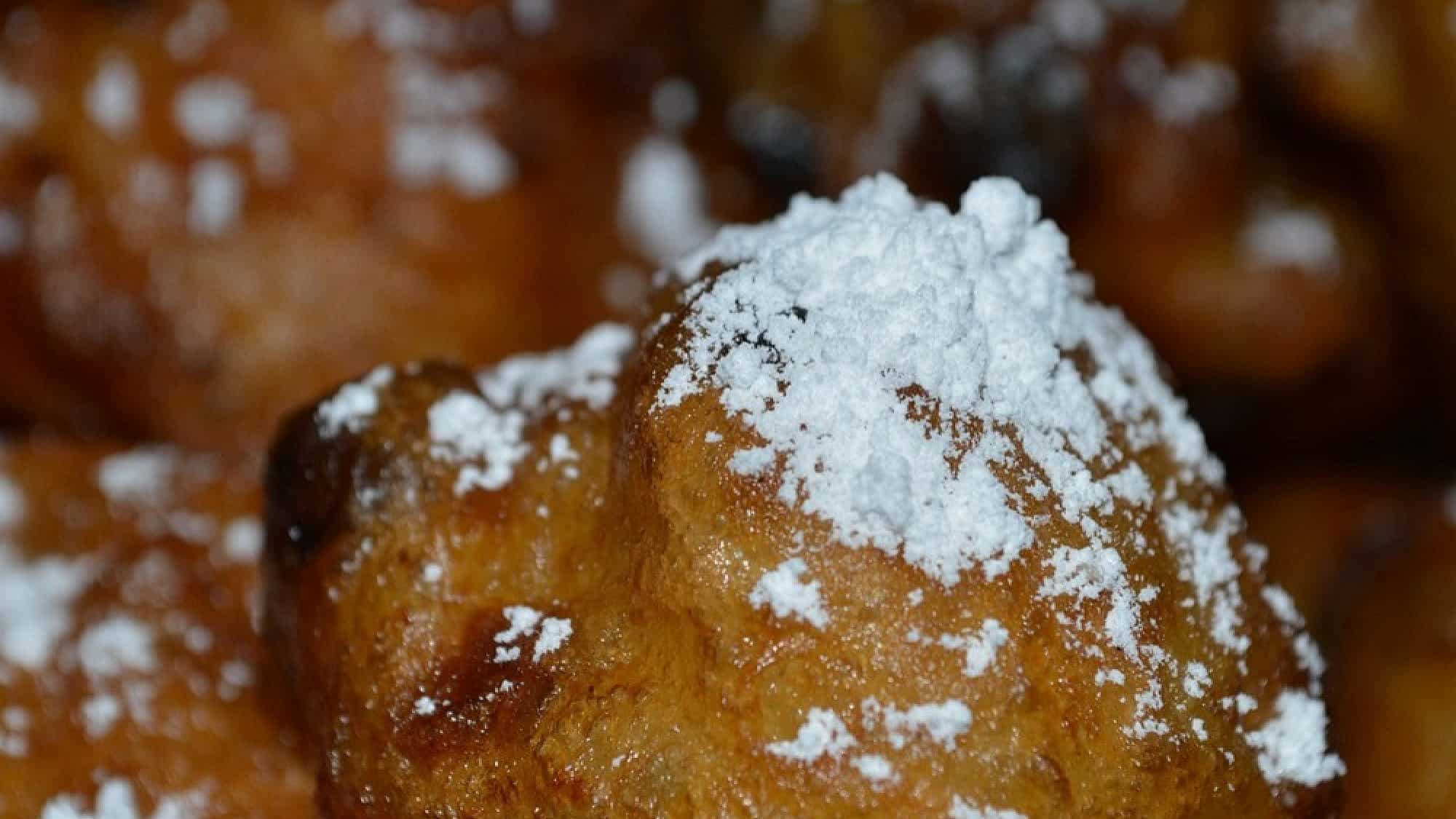It’s tradition! The Jewish holiday of Chanukah means latkes and sufganiyot—lots of them, crisp, hot, and hopefully, not too oily—to help celebrate the victory of Judah Maccabee and his four brothers over the Syrian-Greeks in 165 BCE. This year, the eight-day holiday of Chanukah begins on the evening of Thursday, Dec. 7 (always the 25th day of Kislev on the Jewish calendar) and ends on the evening of Friday, Dec 15. Dishes fried in oil symbolize the miracle of the one cruse of oil left in the Holy Temple that lasted for eight days instead of one. On each of the eight nights, candles are lit on the menorah, dreidel games are played, and heaps of crisp fried latkes and sufganiyot are dished up bowls filled with applesauce and sour cream to spoon over top.
Consider adding related treats to the table this season—cousins of a culinary sort in the form of beignets and funnel cake, also fried in oil. They both come with powdered sugar, and kids and adults alike will enjoy these added delicate desserts that please palates the world over.
For Eastern Europeans, potato latkes were a symbol of Chanukah; potatoes were cheap and often fried in fat leftover from the Passover duck. In modern-day Israel, sufganiyot are the fried doughnuts sold in nearly every food store and on every street corner, and come in absolutely every kind of flavor these days (sea-salt caramel next to fig- and date-filled). But look back not too long ago to the American South in the late 19th and early 20th centuries; in an effort to assimilate, immigrant Jewish women combined regional flavors with Old World ingredients. Think salt herring, fried and served with grits. On a sweeter note, past and present recipes merged into dishes such as pecan pie and beignets—the latter being those scrumptious pastry squares fried in oil and dredged with sugar that have become a mainstay for tourists to places like New Orleans. Today, Jewish homes there celebrate the holiday with platters of hot fried beignets alongside crisp potato latkes.
Make it a family affair. Everyone can pitch in; even little ones can stir the batter with a wooden spoon and be the first official tasters. The recipes below include traditional potato latkes, made easy by using the food processor, so there’s no risk of scraping fingers on a box grater. Leek-and-Parsley Fritters are based on a recipe from my Israeli friend, Alisa Shaya; and crisp, puffy New Orleans beignet recipe uses baking powder instead of yeast.
Oil is the essential frying ingredient. The variety on supermarket shelves can be overwhelming these days. Good frying oil is known for three qualities: being flavorless, affordable and having a high “smoke point.” (A high smoke point is considered 375 degrees Fahrenheit and higher, and is best for frying.) For the recipes here, avoid using olive oil with its overly robust flavor; better to save that more expensive variety for salad dressings and sautéing purposes.
Here’s a primer for some common supermarket oils.
Corn oil: most affordable with a high smoke point. Good for deep frying or shallow frying in a skillet.
Vegetable oil: multipurpose with a high smoke point.
Canola oil: versatile, neutral-flavored cooking oil. Great for all frying methods.
Peanut oil: good for deep-frying with a high smoke point (avoid for those with allergies).
Coconut oil: with a smoke point of 350 to 400 degrees, it’s good for sautéing vegetables and light pan frying (also avoid for those with allergies). Refined generally has a higher smoke point than unrefined.
This year, the message of Chanukah is more significant than ever as Jews the world over search for happiness amid grief and concern for Israel. The light of the menorah gives us hope that soon there will be peace, no more bloodshed, and that all hostages return home to their loved ones.
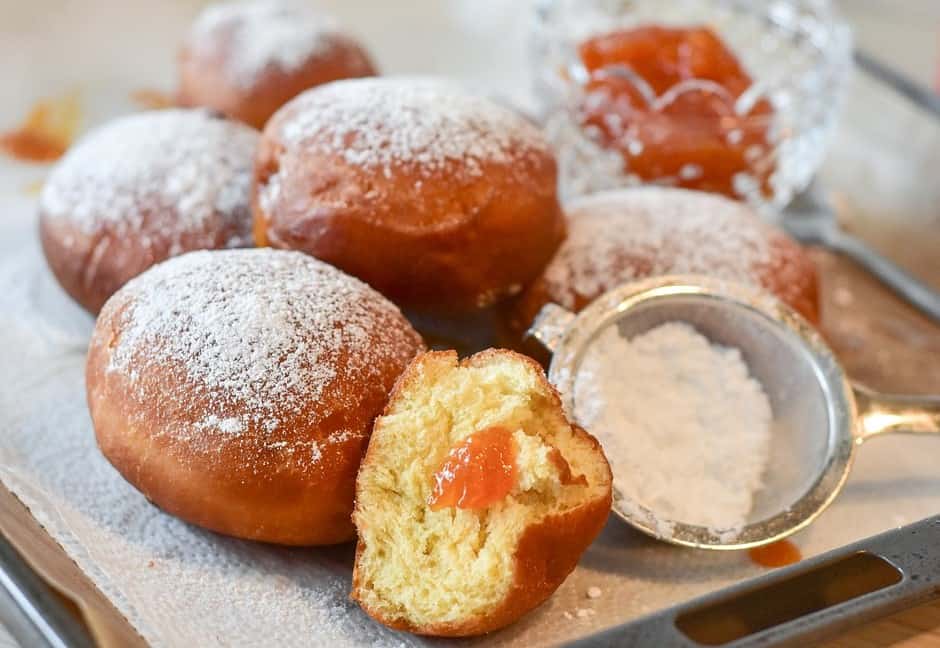
Recipes
Classic Potato Latkes
Alisa’s Leek-and-Parsley Fritters
New Orleans Yeast-Free Beignets
Cheese Beignets
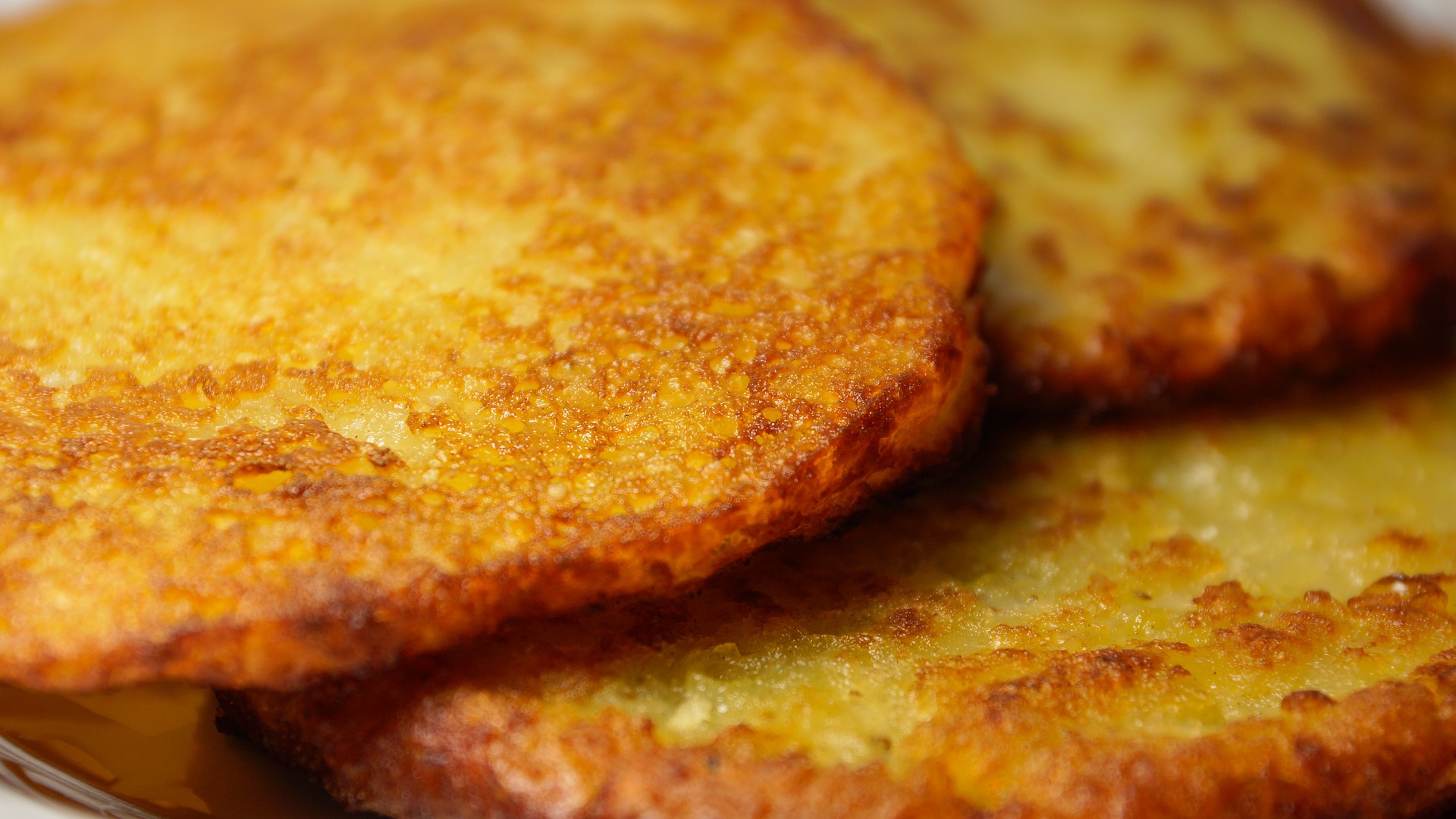
Classic Potato Latkes (Pareve)
Makes 18-20
Cook’s Tips:
*Use a combination of white and red-skinned potatoes. No need to peel red-skinned potatoes.
*May substitute matzah meal for flour.
*Leftovers may be refrigerated. Reheat at 350 degrees for 10 minutes.
Ingredients:
2 eggs
¼ small onion, cut into 3 to 4 pieces
4 medium potatoes, about 1½ pounds peeled and cut into 1-inch chunks
¼ teaspoon baking powder
3 tablespoons all-purpose flour
1 teaspoon salt
½ teaspoon freshly ground pepper
vegetable oil for frying
Directions:
Break eggs into a food processor. Add onion and potatoes. Pulse 3 to 4 times, or until the potatoes are coarsely chopped. Transfer to a bowl.
Add the baking powder, flour, salt and pepper, mixing well.
Heat about a quarter-inch oil in a large skillet over medium-high heat. Drop rounded tablespoonfuls of the potato mixture into skillet pressing lightly with the back of a wooden spoon to flatten slightly. Reduce heat to medium. Cook on both sides until nicely browned, 2 to 3 minutes per side. Drain on paper towels.
Continue frying adding more oil as needed until the batter is used up.
Serve hot with applesauce for a meat meal or sour cream for a dairy meal.
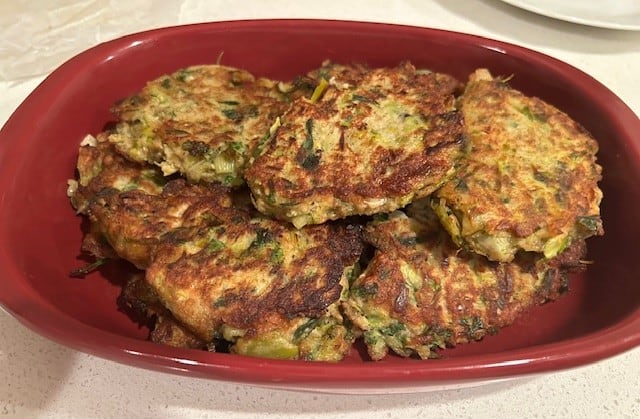
Alisa’s Leek-and-Parsley Fritters (Pareve)
Makes 10-12
Cook’s Tips:
*Pick up store-bought frozen cooked leeks. Thaw and use as needed. No need to cook first.
*To clean leeks: Slice 1-inch thick. Place in a bowl and cover with cold salted water (2 to 3 teaspoons to 1 quart water). Press the center of each slice to separate the rings. Rinse again in cold water to clean thoroughly.
*Add another egg if the mixture is too stiff.
*For deep frying, a thermometer should register 350 to 375 degrees Fahrenheit.
*Sumac (berries) is related to the cashew family and ground into a rich, red-colored spice. It has a similar taste to lemon and brings out the natural flavors of foods it is cooked with.
Ingredients:
2 to 3 medium leeks, white and 2 inches of green part
boiling water to cover
1 cup parsley, cut coarsely, rinsed and packed
3 large eggs, lightly beaten
1½ teaspoons sumac
1 teaspoon each salt and freshly ground pepper or to taste
¾ to 1 cup matzah meal
vegetable oil for frying
Directions:
Place cleaned leeks in a large pot. Cover with boiling water. Cook for 3 to 4 minutes or until just beginning to soften. Drain well.
Place in a food processor. Pulse 4 to 5 times to chop coarsely. Transfer to a mixing bowl.
Add parsley to the food processor (no need to wash the processor). Chop coarsely.
Add to leeks along with eggs, sumac, salt and pepper. Stir in enough matzah meal to make a soft mixture. If too stiff, add another beaten egg.
Heat about a quarter-inch of oil in a heavy skillet. The oil is ready when a 1-inch bread cube toasts in 30 seconds. Drop by tablespoons into the hot oil. Press with a wooden spoon to flatten.
Fry over medium-high heat for 2 to 3 minutes on each side until nicely browned. Do not crowd; allow about a half-inch space between each fritter.
Drain on paper towels. Serve warm.
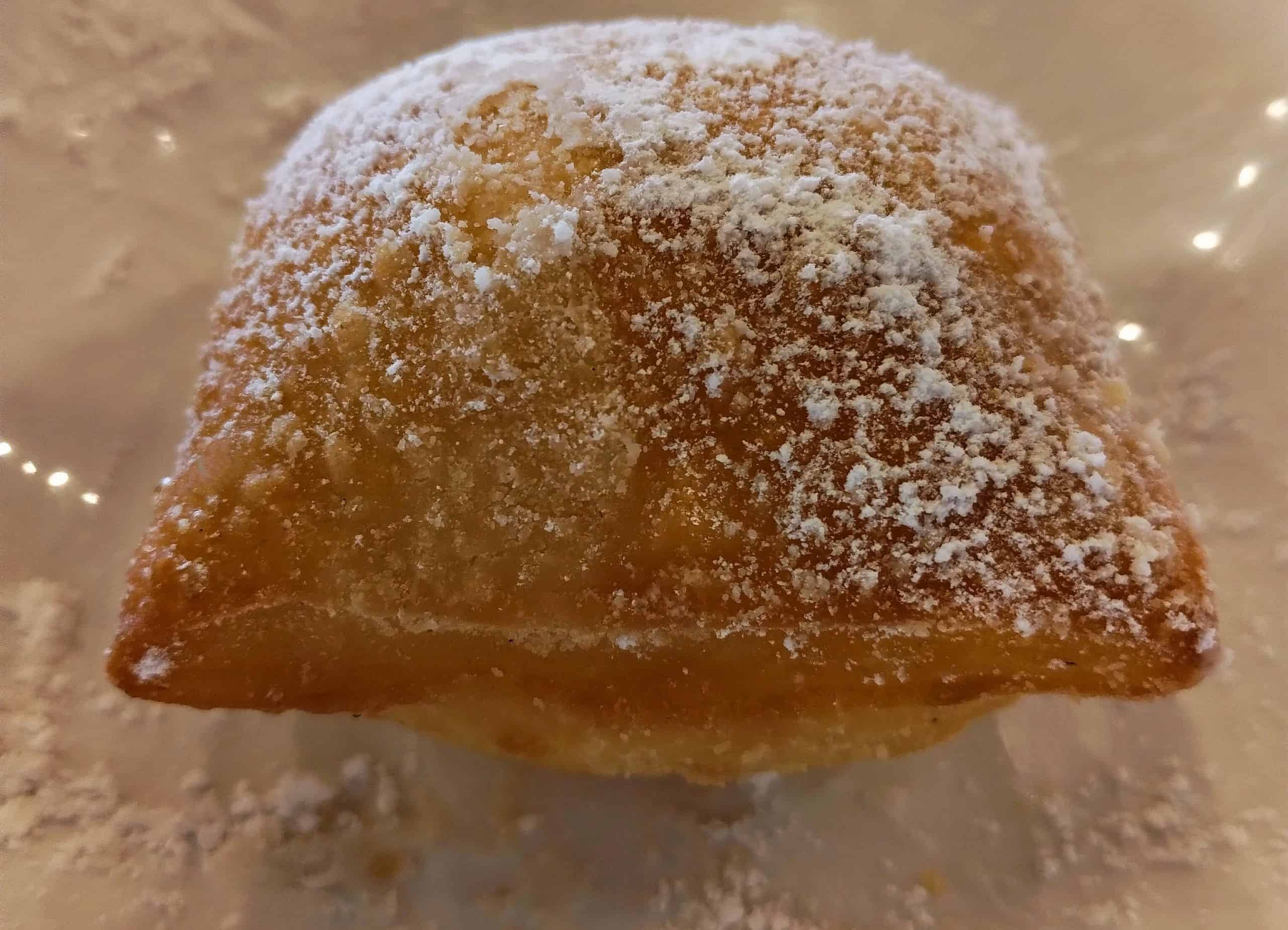
New Orleans Yeast-Free Beignets (Dairy or Pareve)
Makes 18-20
Cook’s Tips:
*If using a deep-fry thermometer, the temperature should reach 360 to 375 degrees, or use the bread test: A 1-inch cube should brown in 30 seconds.
*Make sure baking powder is not outdated.
*Dredge with confectioners’ sugar instead of granulated sugar.
Ingredients:
3 large eggs
¼ teaspoon salt
¼ teaspoon nutmeg
½ cup (1 stick) very soft butter or margarine
3½ teaspoons baking powder
1½ cups all-purpose flour
1½ teaspoons vanilla extract
2 to 3 tablespoons granulated sugar, divided
vegetable oil for frying
Directions:
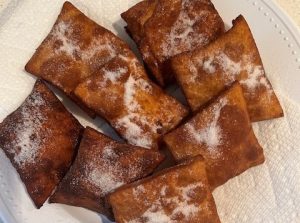
Using an electric hand mixer, beat together the eggs, salt, nutmeg, butter or margarine, flour, vanilla and 1 tablespoon sugar until the mixture comes together to form a sticky ball.
Turn out onto a well-floured board and knead for a minute or two until the mixture forms a smooth ball. Wrap in plastic wrap.
Refrigerate for 1 to 2 hours. Divide the dough in half. Roll into a rectangle about ¼-inch thick.
With a sharp knife, cut into squares or triangles. Repeat with the remaining dough.
Heat 2½ to 3 inches of oil in a heavy pan over medium-high heat to 360 to 375 degrees. Line a baking sheet or large dish with paper towels. Slide pastry pieces into hot oil, a few at a time. Do not crowd. Fry for 1 to 2 minutes to golden brown.
With a slotted spoon, flip over and cook for another 1 to 2 minutes. Both sides should be nicely browned. Drain on paper towels.
Dredge with remaining sugar and serve hot.
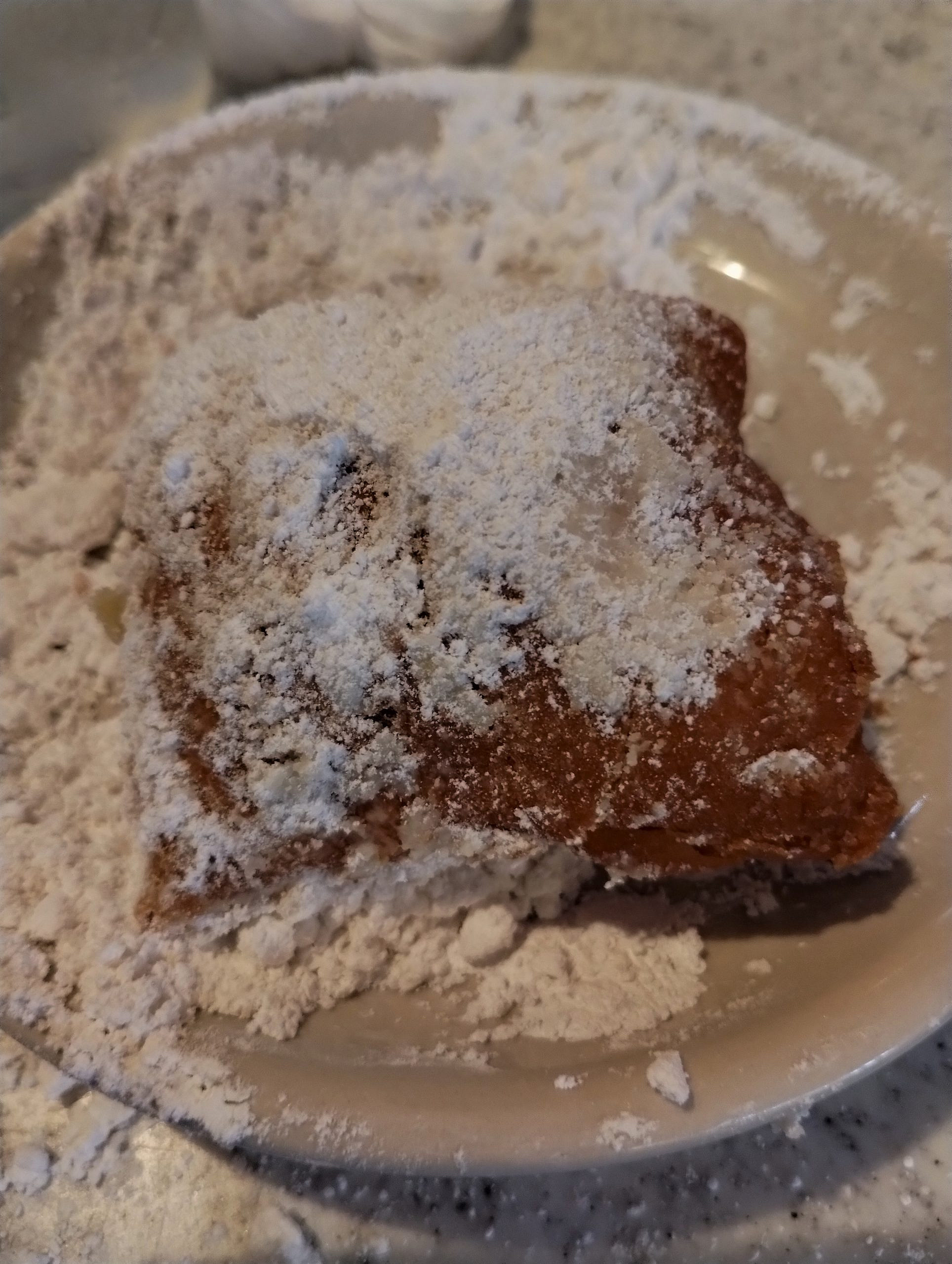
Cocktail Cheese Beignets (Dairy)
Makes 15-18
Cook’s Tips:
*Any finely grated cheese will do or a mixture of cheeses.
*Crisp on the outside, softly melted inside.
Ingredients:
1 cup water
¼ cup (4 tablespoons) butter
1½ cups all-purpose flour, divided
½ teaspoon salt
4 to 5 drops hot sauce
2 rounded teaspoons Dijon-style mustard
3 eggs, lightly beaten
2 cups grated Parmesan cheese
vegetable oil for frying
Directions:
Place water and butter in a medium pot and bring to a boil. Stir to blend in the butter.
Add 1¼ cups flour, salt, hot sauce and mustard. Stir until the mixture forms a sticky ball.
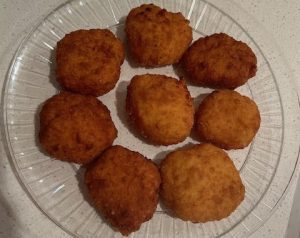
Transfer to a food processor. Add the eggs, processing to a smooth mixture. Add the cheese and process until blended. Cover and chill for 1 hour.
Roll into bite-sized balls and toss in the remaining ¼ cup flour. Deep-fry in hot oil for 2 to 2½ minutes, turning with a slotted spoon to brown evenly.
Drain on paper towels.
Serve warm.
Ethel G. Hofman is a widely syndicated American Jewish food and travel columnist, author and culinary consultant.


























